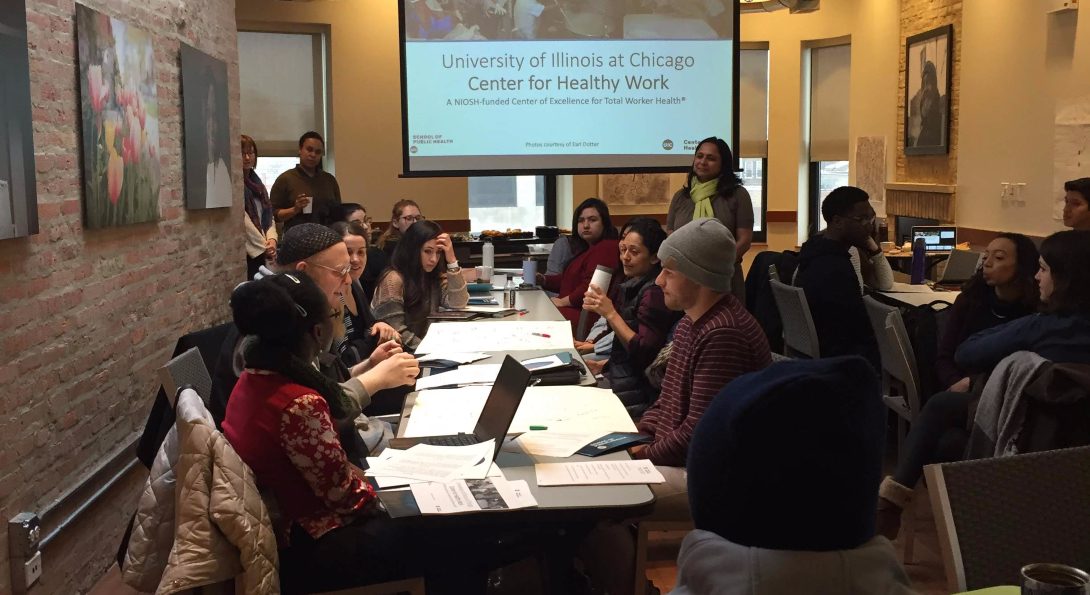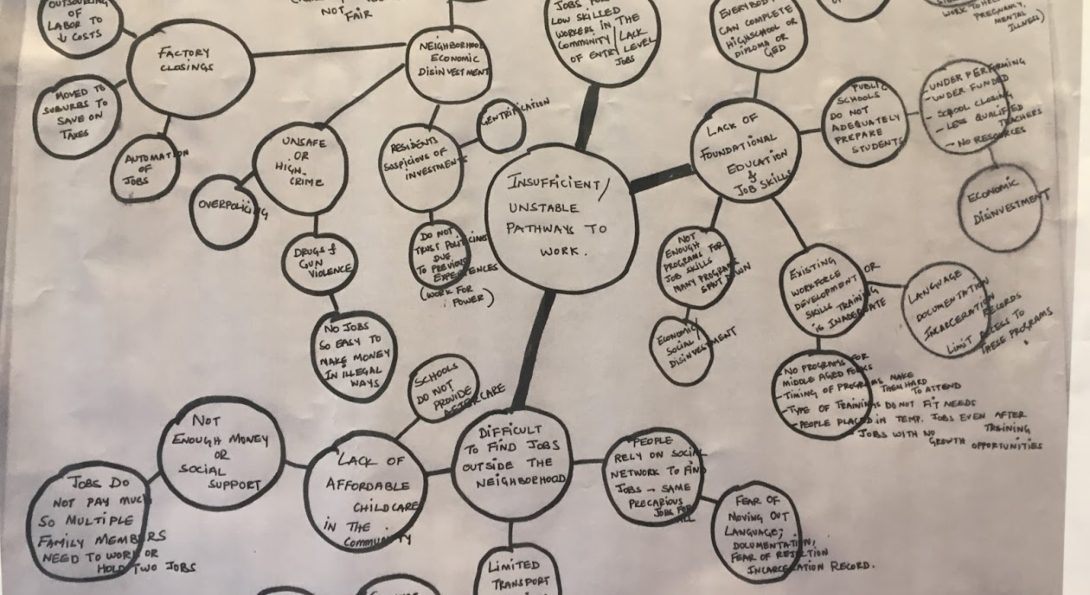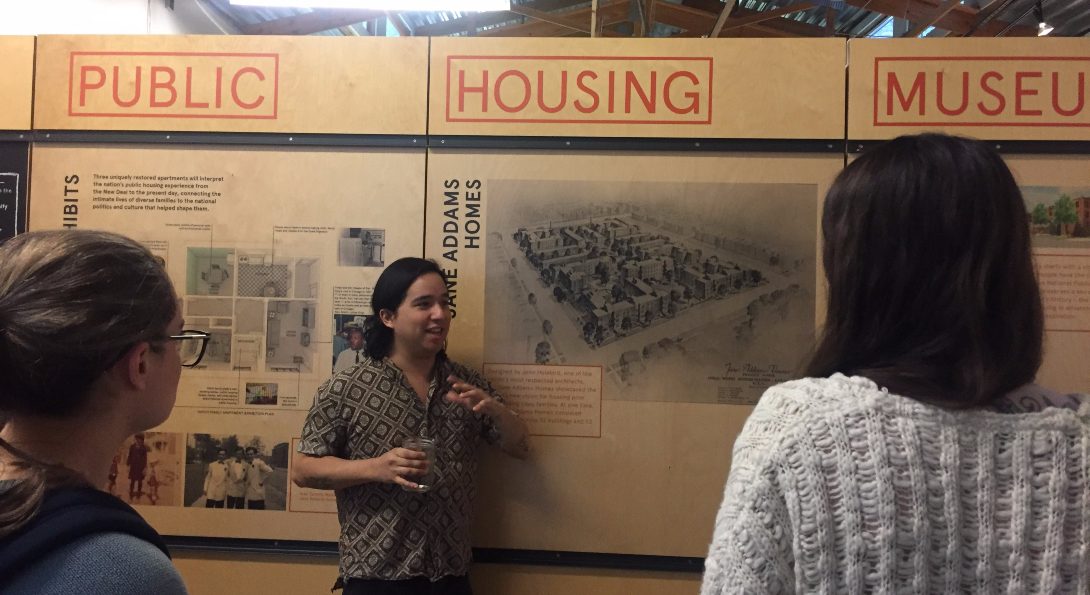Community Ties
Looking to build upon its legacy of community engagement, SPH crafts plans to broaden and deepen its engagement across research, teaching and practice.
Like so many at UIC’s School of Public Health, Linda Forst has community engagement top of mind. As a professor of environmental and occupational health sciences, her research work has taken her to migrant farm workers across four states and day laborers across seven states. She’s presently involved in a participatory research project in the Center for Healthy Work alongside colleagues Jeni Hebert- Beirne, Preethi Pratap and Lorraine Conroy examining the relationship between employment and health in two Chicago communities riddled with social and economic hardships.
In her role as senior associate dean, Forst accepted Dean Wayne H. Giles’ charge to further enliven, broaden, and strengthen community engagement at the School of Public Health. Forst, in fact, spearheaded early efforts to investigate the school’s engagement across its research, teaching and practice activity, including the proposed launch of a redesigned center focused on the process of engagement, participation and equity.
“Our mission is to improve the health, well-being and quality of life of the public, and that’s something that can’t be developed inside a closed lab on campus. That’s why we’re engaging with populations, leaders and advocates to find ways to create healthier communities,” Forst said.
Deep Community Ties

The School of Public Health has a long and distinguished history of community engagement with public health departments, governmental agencies, not-for-profits and grassroots organizations committed to improving human health.
Samuel Dorevitch, an associate professor of environmental and occupational health sciences, for instance, has teamed with the Chicago Park District to test water at beaches and provide messaging around safe swimming. Hebert-Beirne, an associate professor in the Division of Community Health Sciences, led a nearly decade-long, student-engaged research effort examining how residents of Chicago’s Little Village neighborhood, an immigrant-heavy community just southwest of the UIC campus, perceive community health needs and assets. This deeply collaborative, award-winning effort has since expanded to Chicago’s North Lawndale neighborhood using community-based participatory research strategies. Numerous faculty, meanwhile, are investigating environmental health and equity issues on Chicago’s southeast side alongside rooted community partners. “The impact of our research is strengthened by employing engagement strategies and fostering co-learning,” Hebert-Beirne said.
At the state level, SPH and the Illinois Department of Public Health (IDPH) have long been intertwined. Through the agency’s collaborative student internship program, dozens of SPH students have worked with IDPH on projects related to critical issues such as infectious disease surveillance and opioid abuse. “UIC has been able to provide us well-trained students capable of quickly stepping in to help satisfy some pressing issues we’re facing,” IDPH Division of Laboratories Chief Matt Charles said, adding that IDPH has also leveraged faculty expertise to drive a number of its programs. “It’s an undeniable advantage to have access to professionals who see things through a different lens and bring a different perspective.”
Such community-minded work has proven particularly attractive to students, who value the opportunity to experience different public health spheres, apply their learning in real-world environments, and explore potential career possibilities. Fourth-year PhD student Cara Bergo, in fact, selected UIC precisely because of SPH’s focus on applied epidemiology specializing in maternal and child health. “It was a big deal that UIC had a program that would get me working alongside county and state health agencies,” Bergo said.
Bergo has worked with the Illinois and Iowa state health departments while at UIC, meaningful experiences that have included examining maternal mortality and morbidity efforts, evaluating breast and cervical cancer programs and helping to produce an opioid vulnerability index. In the process, she has learned how to navigate large data sets and public sector bureaucracy while also discovering the importance of considering community impact before starting analysis. “And I don’t think I would have learned those things had I chosen a methodology-based program that wasn’t focused on community engagement like UIC is,” Bergo said.
Building on History

With SPH leadership eager to expand its focus on community engagement with both public health practitioners as well as the community at large, Forst led a yearlong effort that included assessing the school’s existing community engagement activities, including the scope of the existing Coordinating Center for Public Health Practice (CCPHP) and the Mid-America Center for Public Health Practice (MCPHP), gathering insights from current community partners such as public health agencies and not-for-profits, and examining the work of peer institutions.
Hebert-Beirne and Caitlin Donato, program coordinator in the Environmental and Occupational Health Sciences Division, have since produced a lengthy report sharing key findings and introducing plans for a Center for Engaging for Health Equity and Action (CEHEA). A redesign of CCPHP, the CEHEA would support excellence in community-engaged research, highlight and harness faculty expertise, and provide funding, training and strategies to facilitate community engagement across SPH.
CEHEA also builds upon the work of MCPHP, which has a 20 year history leading community and partner engagement not only throughout Illinois, but in the 6 state Health Resources & Services Administration (HRSA) region, and nationally through workforce and leadership development. Assessment, planning and evaluation services, as well as and practice-based research, has also been at the core of MCPHP’s mission to make public health organizations smarter, stronger and more effective. Working with partners at the state and local levels was an important strategy for MCPHP to build collaborative approaches to improve public health, but MCPHP rarely works at the ground level. “CEHEA complements MCPHP’s long and robust history with partnership approaches by adding deeper and more engagement at the community level,” said MCPHP’s Director, Christina Welter.
“This effort, this center, is critical. It’s in line with but expanding on what other schools of public health and programs are doing nationally,” said Hebert-Beirne, who has since inherited the role of interim associate dean for community engagement.
Building on History, continued

The focus is presently on building upon the sound infrastructure established by the CCPHP to expand faculty, student, and staff members’ opportunity to integrate engagement strategies and activities across their research, teaching, service, and practice work. To that end, SPH is very excited about the recent refunding of the UIC CDC-funded Prevention Research Center which is newly named the Policy, Practice and Prevention Research Center (P3RC). “The P3RC aims to work closely with its partners to build and translate evidence and strengthen leadership capacity to advance policies and practices that improve population health and equity,” said Dr. Lisa Powell, Director of the P3RC. The P3RC core research project, led by Dr. Jamie Chriqui and partners at Chicago Public Schools (CPS), will build upon nearly a decade of collaboration between Chriqui and her team and CPS’ Office of Student Health and Wellness to study the effectiveness of using a health-related navigator in implementing health education, health services, nutrition, and physical activity opportunities in CPS schools to provide better support for CPS students. “CPS is actually at the forefront of school health, wellness, and school nutrition,” Chriqui noted. “I look forward to continuing this collaboration on important school-and student-level health and wellness-related issues.”
A more coordinated, robust effort, Forst said, will help SPH elevate its standing with community partners, better align research and practice, establish SPH as a national leader in community engagement scholarship and maximize UIC’s impact on the health and well-being of the public it’s committed to serving. “We recognize that science needs to interact with people in the real world and so we want to be involved in the community right from the beginning,” Forst said. “We want to take ownership of problems with our community partners and invest together in solutions that will have a real impact on peoples’ lives because that’s ultimately why we’re here.”